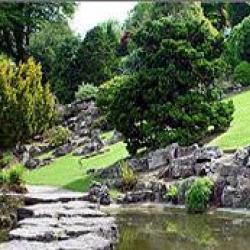Years of life of the Nobel. Alfred Nobel is the greatest inventor and peace activist. The Nobel Prize in Mathematics was never established
Alfred Nobel (full name– Alfred Bernhard Nobel) is a famous Swedish chemist, inventor and engineer. Founder of the Nobel Prize. One of his main inventions was dynamite, which allowed Alfred to earn a huge fortune.
Nobel family
Alfred Bernhard Nobel was born in Stockholm October 21, 1833. His father - Emmanuel Nobel, mother- Andriette Nobel. He was the third son in a family of only 8 children.
However, only four of them survived - Alfred, Robert, Ludwig and Emil Nobel. Emil later died at one of the family factories.
Study period
At 9 years old Alfred arrives in St. Petersburg. At that time, Emmanuel, his father, was engaged in the production of steam units in Russian Empire. The boy had to study, and he was assigned to a private school, where he studied until the age of 17.
The young Nobel's favorite subjects were physics and chemistry, which defined him further fate. AT free time he was in his father's firm, delving into its essence.
In 1949 father, on the recommendation of the Russian scientist-chemist N.N. Zinina, sends his son to study in depth physics and chemistry in Germany. Then Alfred Nobel left for Paris. After that, he trained and worked in America at a factory John Erickson- Renowned inventor. There he studied the features of the manufacture of steam units: for cars and ships.
Return to family business
In 1853 Alfred Nobel returned to St. Petersburg. He began working for his father's company, whose main activity at that time was the production of ammunition. It was in this year that the Crimean War began, which lasted until 1856.
During the war, the demand for Nobel Sr.'s products was high, and the company prospered. However, after the war, things did not go well in the family business: Russia did not need ammunition, and parts for steamships were extremely rarely required. Therefore, the Nobel family decided return to their homeland - to Stockholm.
Discovery of dynamite
In his native lands, Alfred continued to do science in a laboratory that his father built especially for him. The experiments were based domestication of nitroglycerin opened in 1842. Alfred tried to control this dangerous substance by conducting various experiments.
He managed to make a capsule filled with mercury - this is how the detonator turned out. And the most important discovery of his life was invention of dynamite. He got it by combining nitroglycerin with other substances. In 1867, dynamite was patented by Alfred Nobel.
Immediately after that, Alfred offered the Swedish railroad his invention, which could help in punching tunnels. Since the landscape of Sweden is rocky, the proposal was accepted "To cheer" and greatly accelerated the construction of railways.
Big success
First practice using dynamite made this stuff popular. Its further use was carried out in a variety of industries and for a variety of purposes:
- Under the very high mountain Alps - Mont Blanc - a tunnel was laid, with a length of 11,600 meters.
- Laying the Corinth Canal in Greece.
- Removal of underwater rocks in the navigable rivers of New York.
- The bed of the Danube was cleared.
Immediately, dynamite factories began to grow in Europe and America. This began to bring huge profits to Alfred Nobel, who owned one-fifth of all explosives production.
Second invention
In 1873, Alfred left for the French capital, Paris. There he continued his scientific and inventive activities. As a result of labors and experiments, his second miracle was born - smokeless powder, called "ballistite".
In the late 80s, Nobel patents this invention and sells his patent to the Italian government without hesitation. This fact upset the leadership of France, and in 1891 Alfred had to leave Paris. He moved to Italy and settled in the city of San Remo.
Personal life of Alfred Nobel
What is known about the personal life of Alfred Nobel is that he never been married. He lived as a hermit and devoted himself entirely to his beloved science, engineering, invention.
Nobel was fluent in several languages: French, Russian, English and German. He strove for peace and himself never wanted to become famous. Therefore, at the end of his days, Nobel devoted all his time to his laboratory in the Italian Riviera, built under an orange grove.
In recent months, he felt very tired, he developed angina pectoris, he was tormented by constant pain in the region of the heart.
December 10, 1896 year, at the age of 63, Alfred Nobel died of a cerebral hemorrhage. He was buried in his homeland - in Stockholm.
Nobel Prize
In 1888 a French reporter published in the newspaper the news of the death of Alfred Nobel by mistake. In fact, one of his brothers, Ludwig, died that year. Seeing an article in a newspaper about himself, as journalists wrote about him - "Blood Millionaire", "dynamite king", "merchant of death" Alfred was very impressed.
He was a pacifist by nature and did not want to remain in the memory of mankind as a villain on a global scale. That's why November 27, 1895 he wrote his will:
“I, the undersigned, Alfred Bernhard Nobel, having considered and decided, hereby declare my will in respect of the property acquired by me ... brought the greatest benefit to mankind.
The indicated percentages should be divided into five equal parts, which are intended: the first part to the one who made the most important discovery or invention in the field of physics, the second - in the field of chemistry, the third - in the field of physiology or medicine, the fourth - to the one who created the most significant literary work, reflecting human ideals, the fifth - to someone who will make a significant contribution to the rallying of peoples, the destruction of slavery, the reduction in the number of existing armies and the promotion of a peace agreement.
…My particular desire is that the awarding of prizes should not be influenced by the nationality of the candidate, so that the most deserving ones will receive the prize, regardless of whether they are Scandinavians or not.”.
Almost all people in the world know about Alfred Nobel today. His famous Nobel Prize is sought by researchers and scientists. That is how this amazing man entered world history.
Although many also know that the great Alfred Nobel also invented dynamite during his lifetime. Biography of Nobel - interesting story life of the inventor and personality.
Relatives and friends of the great inventor
On October 21, 2833, Alfred Bernhard Nobel, the future famous chemist and inventor, engineer and founder of a huge world-class award, was born in the Swedish city of Stockholm. The biography of this interesting person surprises many biographers to this day.
Alfred was born to the family of Emmanuel and Andrietta Nobel, who had eight offspring in total. But only four survived: Alfred, Robert, Emil and Ludwig.
Although later, at the age of twenty, during experiments with dynamite discovered by Alfred Nobel, another son of the Nobel couple, Emil, dies. This grief breaks the father of the family with paralysis, leaves a deep bitter mark in the soul of Alfred himself. But he still does not leave his ideas and makes discoveries one after another.
Key dates in the life of the founder of the famous Nobel Prize
 A brief biography of Alfred Nobel can be represented by the following main events:
A brief biography of Alfred Nobel can be represented by the following main events:
- 1842 - the Nobel family moved to St. Petersburg. Alfred Nobel developed the idea of producing torpedoes.
- 1849 - Alfred Nobel begins to study in Europe and America. For two years the young man travels the world, visits Denmark, Italy, Germany, France, then America.
- 1851 - return to Russia. Alfred Nobel becomes a manufacturer, fulfilling the orders of the Russian army.
- 1853 - The Crimean War helps the Nobel family business to make good profits and enter the heyday.
- 1859 - Ludwig Emmanuel Nobel becomes a manufacturer. Due to the bankruptcy of the family business, Alfred returns to Sweden with his father and begins to work closely on explosives. At the same time, he receives a loan of 100 thousand francs and begins research work in the field of chemistry, experimenting and inventing new elements, compounds and mixtures.
- 1868 - Alfred Nobel discovers dynamite, consisting of a mixture of nitroglycerin with other substances that have the ability to absorb it.
- 1876 - the discovery of "explosive jelly" - the combination of nitroglycerin with collodion. This "jelly" had a stronger explosiveness than the previously discovered dynamite. The following years are full of discoveries of other combinations of nitroglycerin with substances. The first smokeless powder, called ballistite, was a huge leap ahead of dynamite. Ballistite is followed by the discovery of cordite.
- 1889 - participation in the World Peace Congress.
- 1894, 1895 - Litigation over Nobel's statement that cordite was already included in his earlier patent of discoveries.
- 1896, December 10, a villa in San Remo in Italy - Alfred Nobel died of a cerebral hemorrhage at the age of sixty-three. Nobel's tomb is located at the Stockholm cemetery Norra begravningsplatsen.
This is the fate of Alfred Nobel, presented in a brief biography the greatest man with a worldwide reputation.
An interesting but little known fact
Few people know, but Alfred Nobel not only invented dynamite and established a nominal prize, he revealed his dramatic talent. True, the biography of Nobel the playwright cannot boast of an extensive list of works he created. The bulk of his works - novels, poems, plays - were never published. Only one work is known - a play about Beatrice Cenci called "Nemesis", completed by him already at death.
This tragedy in four acts was met with hostility by churchmen, so the entire circulation of the publication, published in 1896, was destroyed after Nobel's death, with the exception of three copies.
But, fortunately, in Sweden in 2003, a bilingual edition of the play was published, written both in Swedish and in Esperanto. And in 2005, the world had the good fortune to get acquainted with this work, played on the Stockholm stage in memory of the great scientist on the day of his death.
This fact indicates how versatile this amazing person, Alfred Nobel, was talented. And it will seem quite surprising to many that the famous inventor and chemist was seriously thinking about giving up his research and experiments and setting foot on the path of writing.
I wonder if the population of the earth would have won then or turned out to be a loser? After all, perhaps dynamite would not have been invented then, or would have been invented much later. And instead of it, we would get a lot of talented works of the highest level ...
The character of a man with a worldwide reputation
 Alfred Nobel surprised his contemporaries with his controversial character. Not everyone understood his paradoxical behavior. Being quite wealthy, Alfred gravitated downright to the Spartan way of life, he longed for solitude. Indeed, in the era of developing capitalism, many successful businessmen were not such.
Alfred Nobel surprised his contemporaries with his controversial character. Not everyone understood his paradoxical behavior. Being quite wealthy, Alfred gravitated downright to the Spartan way of life, he longed for solitude. Indeed, in the era of developing capitalism, many successful businessmen were not such.
However, fate seemed to deliberately put him in conditions that disgusted him. Life forced Nobel, who could not stand the bustle of the city, to spend most of his time in cities. Being a homebody and preferring thoughts in quiet solitude, Alfred Nobel spent a lot of time traveling around the world.
Working on explosives and mixtures, Alfred Nobel was an opponent of murder and violence, did a great job in the name of peace on earth. But the fact remains: dynamite was discovered by him.
Alfred Nobel surprised his contemporaries by the fact that he led healthy lifestyle life, as they would say today. He had a negative attitude towards alcohol, smoking, gambling.
At that time, bigwigs, by and large, were engaged in two things: making money without thinking about their "smell", and spending millions, trying to "take everything out of life that you can." Alfred Nobel, preferring solitude, loved to read. In his chic library were the works of the great scientists of that time. With pleasure Nobel Alfred read his contemporaries: Maupassant, Balzac, Turgenev, Hugo.
Fashionable at that time, the naturalism inherent in the writer's pen of Emile Zola was not to Nobel's taste. But he could re-read the works of philosophers of all times several times, reflecting on this or that position and making his own unique notes and developments on this or that issue. After all, Alfred Nobel himself was not only a chemist, but also a doctor of philosophy.
In memory of discoveries
Alfred Nobel, inventing dynamite and other explosive mixtures, was an ardent pacifist. He saw a different application of his discoveries, which would help develop the progress of mankind, and not kill each other. But the persecution that began in the media about the fact that Alfred Nobel was able to invent dynamite prompted him to think that another bright mark should be left in this world.
So the inventor came to the decision to establish a nominal prize after his death, writing a will on November 27, 1895, according to which most of his accumulated fortune - 31 million crowns - goes to the Nobel Prize fund. This fact of Nobel's life made his biography a historical milestone on a global scale.
In addition to the well-known Nobel Prize, Alfred Nobel entered world history as the discoverer of the chemical element, which was named Nobelium in his honor.
The name of the great scientist-chemist is Dnepropetrovsk University and the Stockholm Institute of Physics and Chemistry.
Video about Nobel:
Read more...
Do you find the article helpful?

Born in the family of an inventor, Alfred Nobel devoted his whole life to his only love - working on a substance that would prevent all wars in the world. A fanatical commitment to explosives played a cruel joke on him, but it was his fatal mistake that became the motivation - to establish a prize for greatest achievements in science and art.
Family and childhood
Alfred Nobel was born in the family of a gifted inventor and mechanic Emmanuel, and was the third child of eight born. Unfortunately, of all the children in the family, only four survived - in addition to Alfred, three of his brothers.
In the year when the future famous chemist was born, his parents' house burned to the ground. Over time, some symbolism will be seen in this - after all, fire and explosions will become part of Nobel's life.
After the fire, the family had to move to a much smaller house on the outskirts of Stockholm. And the father began to look for work in order to somehow feed his large family. But he did it with difficulty. Therefore, in 1837, he fled the country to save himself from creditors. First, he went to the Finnish city of Turku, then moved to St. Petersburg. At that time he was working on his new project - explosive mines.
While his father was looking for happiness abroad, three children and his mother were waiting for him at home, barely making ends meet. But five years later, Emmanuel called his family to Russia - the authorities appreciated his invention and offered to work on the project further. Emmanuel moved his wife and children to St. Petersburg - out of dire need, the family suddenly falls into the upper strata of society. And the children of Emmanuel have a chance to receive a good education. At 17, Alfred could boast of knowing five languages: Russian, Swedish, German, English and French.
Despite his good knowledge of technology and engineering, Alfred was also very interested in literature. But the father was not very happy when his son announced his desire to devote his life to writing. Therefore, the father goes to the trick: he gives his son the opportunity to go on an expedition around the world, but in return he forever forgets about literature. The young man could not resist the temptation of travel and went to Europe, and then to America. But, even having made a promise to his father, Alfred could not abandon literature forever: secretly, he continues to write poetry. Although the courage to publish them, he still lacks. Over time, he will burn everything written, showing readers only his only work - the play "Nemesis", which he wrote almost at death.
Meanwhile, things are going well for Father Alfred - during Crimean War his inventions were very useful to the Russian government. Therefore, he was finally able to get rid of long-standing debts in Sweden. Alfred later refined his experiments with explosives, making a career in this area.
Alfred and explosives
While traveling in Italy, Alfred met the chemist Ascanio Sobrero. The main development of his life was nitroglycerin - an explosive substance. Although the researcher himself did not fully understand where it could be applied, Alfred immediately appreciated the novelty - in 1860 he wrote in his diary that he was "working on a new project and had already achieved very great success in experiments with nitroglycerin."
After the end of the Crimean War, the need for explosives in the Russian Empire decreased, and Emmanuel's affairs again went badly. He returned to Sweden with his family, soon came to Alfred, who continued his experiments on a new invention - dynamite.
In 1864, an explosion occurred at the Nobel factory - 140 kg of nitroglycerin detonated. As a result of the accident, five workers died, among them was Alfred's younger brother Emil.
The Stockholm authorities forbade Alfred to continue to experiment in the city, so he had to move the workshop to the shore of Lake Malaren. There he worked on an old barge, trying to figure out how to make nitroglycerin explode when needed. After some time, he achieved a result: nitroglycerin was now absorbed into another substance, while the mixture became solid and no longer exploded by itself. So Alfred Nobel invented dynamite, in addition, he developed the detonator.
In 1867, he officially patented his development, becoming the sole copyright holder for the production of dynamite.
In 1871, Nobel moved to Paris, where he wrote his only play, Nemesis. But almost the entire circulation was destroyed - the church decided that the drama was blasphemous. Only three copies survived, on the basis of which the play was staged in 1896.
For the first time after that, the play was published only 100 years later - in 2003 in Sweden, and two years later they made a premiere in one of the theaters in Stockholm.


"King of Dynamite"
In 1889, another brother of Alfred, Ludwik, died. But the reporters were mistaken and decided that the researcher himself had died, so they “buried him alive”, publishing an obituary in which Nobel was called “a millionaire who made a fortune on blood” and “death merchant”. These articles unpleasantly struck the scientist, because in fact he had a completely different motivation when he invented dynamite. He was an idealist and wanted to create a weapon whose destructive power alone would not give people even thoughts of conquering other countries.
Since he was already very famous and rich, he began to donate a lot to charity, especially sponsoring those organizations that were engaged in promoting peace.
But after those articles, Nobel became more withdrawn and rarely left the house or his laboratories.
In 1893 he was given an honorary doctorate from the Swedish University of Uppsala.
While living in France, he continued his experiments: he developed the so-called "Nobel lighters" that would help to remotely ignite the detonators. But the French authorities were not interested in the development. Unlike Italy. As a result of the scandal, Alfred was accused of treason and he had to leave France - he moved to Italy and settled in the town of San Remo.
On December 10, 1896, Nobel died at his villa from a cerebral hemorrhage. He was buried in his native Stockholm at the Norra Begravningsplatsen cemetery.


Nobel Prize
In his will, the "dynamite king" indicated that all his property should go to charity. Its 93 factories produced about 66.3 thousand tons of explosives per year. He invested huge amounts in various projects during his lifetime. In total, it was about 31 million Swedish marks.
Nobel ordered all his property to be turned into capital and securities - from them to form a fund, the profit from which every year should be divided between the most prominent scientists of the outgoing year.
The money was to be awarded to scientists in three categories of science: chemistry, physics, medicine and physiology, as well as in the field of literature (Nobel emphasized that it must be idealistic literature), and activities for the good of the world. Five years after the death of the scientist, the courts dragged on - after all general state valued at nearly $1 billion.
The first Nobel Prize ceremony was held in 1901.
- Alfred Nobel in his will did not indicate the need to issue an award for achievements in the field economic sciences. The Nobel Prize in Economics was established by the Bank of Sweden only in 1969.
- There is an opinion that Alfred Nobel did not include mathematics in the list of disciplines of his prize due to the fact that his wife cheated on him with a mathematician. In fact, Nobel never married. The real reason for ignoring mathematics by Nobel is unknown, but there are several suggestions. For example, at that time there was already a prize in mathematics from the Swedish king. Another is that mathematicians do not make important inventions for mankind, since this science is purely theoretical.
- The name of the Nobel synthesized chemical element nobelium with atomic number 102;
- In honor of A. Nobel, the asteroid (6032) Nobel, discovered by astronomer Lyudmila Karachkina at the Crimean Astrophysical Observatory on August 4, 1983, is named.
Swedish chemical engineer, entrepreneur, founder of the famous awards Alfred Bernhard Nobel was born on October 21, 1833 in Stockholm. His father, Immanuel Nobel, was an engineer and inventor. In 1837, due to financial problems, he moved to Finland and then to Russia, settling in St. Petersburg.
Alfred's mother, Andriette Nobel, remained in Stockholm to take care of the family, which at that time had two more children besides Alfred - Robert and Ludwig.
In Russia, Emmanuel Nobel proposed to Tsar Nicholas I a new design of sea mines. After testing Russian government allocated money to Nobel for the development of the business. Soon he received permission to establish a foundry for the production of weapons. The Nobel plant produced machine tools for the production of cart wheels, the first home heating systems in Russia using hot water. In 1853, Emmanuel received the Imperial Gold Medal for equipping 11 warships with steam engines made by him.
In October 1842, Andrietta and her children came to her husband, and a year later another son, Emil, appeared in their family.
The four Nobel brothers received a first-class home education with the help of visiting teachers. The children were engaged natural sciences studied languages and literature. At the age of 17, Alfred could speak and write in Swedish, Russian, French, English and German.
In 1850, his father sent Alfred on a trip to France, Italy, Germany and the United States. In Paris, for a year, the young man worked in the laboratory of the famous chemist Theophile Jules Pelouse, who in 1836 established the composition of glycerin. Ascanio Sobrero worked in his laboratory from 1840 to 1843, who first obtained nitroglycerin.
In 1852, Alfred returned to St. Petersburg and continued to work at his father's enterprise.
After the defeat of Russia in the Crimean War, Nobel lost military orders, and his enterprise went bankrupt. In 1859 he returned to Sweden with his wife and Emil. Robert moved to Finland, Ludwig very successfully liquidated his father's plant and founded his own plant, Ludwig Nobel, which would later be called Russian Diesel. Alfred Nobel worked for the famous chemist Nikolai Zinin, who, since 1853, had been experimenting with nitroglycerin (together with his student Vasily Petrushevsky). In May 1862, Alfred Nobel began his first independent experiments with this substance, and in 1863 he made an underwater explosion in the suburbs of St. Petersburg, using a fuse invented by him, later called "Nobel". An attempt to patent a method of using nitroglycerin as an explosive in the Main Engineering Directorate of St. Petersburg ended in failure, and Nobel went to his parents in Stockholm. Here he engaged in further experiments with nitroglycerin and in October 1864 received a patent in Sweden for the production of an explosive mixture and his fuse. At the same time, together with his father and brothers, he began the construction of two factories for the production of nitroglycerin. However, soon there was a powerful explosion on one of them, located in Heleborg, as a result of which Alfred's younger brother, Emil, died.
Accidents while working with nitroglycerin occurred more and more often, and the Swedish government imposed a ban on its production. To avoid bankruptcy, Nobel undertook an intensive search for ways to reduce the explosiveness of nitroglycerin. In 1866, he discovered that the power of nitroglycerin stabilizes diatomaceous earth, a finely porous sedimentary rock composed of the siliceous skeletons of unicellular marine organisms, diatoms. He mixed nitroglycerin with diatomaceous earth and in 1867 received a patent for his discovery, dynamite.
Interest in dynamite was exceptionally great, and the construction of factories for its production began in a number of countries. Some of them were built by Nobel himself; others purchased a license to use his patents. During this period, the Swedish engineer and inventor proved himself to be an outstanding entrepreneur and a good financier. At the same time, he continued his research in the field of chemistry and created new, even more effective explosives. In 1887, after numerous experiments, he received a smokeless nitroglycerin gunpowder - ballistite. The products of Nobel's dynamite factories quickly conquered the international market and brought in huge profits. At the same time, Nobel himself was an ardent pacifist and maintained ties with some public figures. late XIX century, preparing the Congress for Peace.
Nobel Prize: establishment history and nominationsThe Nobel Prizes are the most prestigious international prizes awarded annually for outstanding Scientific research, revolutionary inventions or major contributions to culture or society and named after their founder, the Swedish chemical engineer, inventor and industrialist Alfred Nobel.On March 14, 1893, Nobel made a will in which he disposed of the main part of the inheritance after the payment of debts and taxes, as well as deducting the share and gift bequeathed to the heirs in the amount of 1% of the Austrian Peace League and 5% of Stockholm University, the Stockholm Hospital and the Karolinska Medical Institute, hand over to the Royal Academy of Sciences. This amount was intended "to form a fund, the proceeds of which will be distributed annually by the Academy as a reward for the most important and original discoveries or intellectual achievements in a wide field of knowledge and progress." On November 27, 1895, Nobel wrote a second will, canceling the first. The new text of the will stated that his entire fortune should be turned into money, which should be invested in reliable shares and other securities - they form a fund. The annual income from this fund shall be divided into five parts and distributed as follows: one part is given for the largest discovery in the field of physics, the second for the largest discovery or invention in the field of chemistry, the third for discoveries in the field of physiology and medicine, the remaining two parts are intended to reward individuals who have achieved success in the field of literature or the peace movement.
December 7, 1896 Nobel suffered a cerebral hemorrhage, and December 10, 1896 died in San Remo (Italy). He was buried at the Norra cemetery in Stockholm.
Nobel's second will was opened in January 1897. After completing all the formalities, Nobel's idea became a reality: on June 29, 1900, the foundation's charter was approved by the Swedish Parliament. The first Nobel Prizes were awarded in 1901.
During his life, Nobel patented 355 inventions in various countries. Nobel's companies were located in about 20 countries, and various explosives were produced according to his patents in 100 factories around the world.
Nobel lived and worked in many countries, including Sweden, Russia, France, Great Britain, Germany and Italy. He was passionate about literature and wrote poetry and plays. In his youth, he seriously hesitated, deciding whether to become an inventor or a poet, and shortly before his death he wrote the tragedy Nemesis.
The material was prepared on the basis of information from RIA Novosti and open sources
Alfred Nobel short biography outlined in this article.
Alfred Nobel short biography
Alfred Bernhard Nobel- Swedish chemist, engineer, inventor of dynamite
Nobel's father was an experienced engineer and an outstanding inventor, and tried to establish a profitable business in Sweden. In 1842, the family moved to St. Petersburg, where his father headed the production of explosives. In Russia, wealthy parents hire Alfreda private teachers. He easily masters chemistry and speaks fluently, in addition to his native Swedish, English, French, German and Russian.
In 1850, when Alfred reached the age of 17, he went on a journey during which he visited Europe and then the United States. In Paris he studied chemistry, and in the USA he met John Ericsson, the Swedish inventor of the steam engine. After 3 years, returning to St. Petersburg, Alfred Nobel began working in his father's company, which specialized in the production of ammunition during the Crimean War. After the end of the war, the company began to produce parts for steamships being built on the Caspian Sea and the Volga River. Returning to Sweden with his family, Alfred devoted all his time to mechanical and chemical experiments.
In 1863, Alfred managed to invent a detonator that made it possible to use gunpowder to explode nitroglycerin. This invention created his reputation and raised his well-being. He became the richest chemist in history. But a successful invention turns into a tragedy. His Stockholm lab is blown up. From a powerful explosion, his brother Emil and a close friend, the chemist Hetzman, die.
Nobel never allowed the idea that dynamite would be used not only in construction and mining, but also to destroy people. The news of the latter caused the inventor to have a heart attack. In the future, he repeatedly made unsuccessful attempts to prohibit the use of this explosive for military purposes.
In the 1980s, Nobel invented smokeless powder. All European countries began to buy this explosive.
Nobel continues to invent. Total number his patents reach 355. Nobel also experimented with artificial substitutes for silk, leather and rubber.
In 1891, after a quarrel with France, Nobel established his residence in San Remo. There he built a small chemical laboratory, in 1894 he acquired an ironworks in Verlande. At the same time, Alfred began to feel pain in his heart. He consulted doctors in Paris and was warned about the development of angina pectoris (the heart muscle is not adequately supplied with oxygen). Nobel tried to finish and left a handwritten note of his dying wish.
On December 10, 1896, Alfred Nobel died at his villa in Sanremo, Italy, from a cerebral hemorrhage. He was 63 years old.







